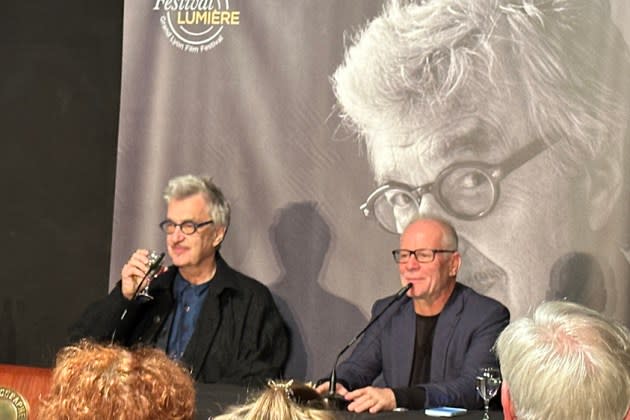Wim Wenders Talks SAG-AFTRA Strike at Lyon’s Lumiere Festival, Says U.S. Studios’ Obsession With Sequels Which ‘Kills Imagination and the Idea of Cinema’

While at the Lumiere Film Festival in Lyon, German film master Wim Wenders said he shares Martin Scorsese’s deep concern over Hollywood’s obsession with sequels, and worries about AI in line with U.S. actors who are still on strike.
“Actors and screenwriters are afraid of becoming obsolete,” said Wenders when addressing the ongoing SAG-AFTRA strike during a press conference on Saturday. The veteran writer-director, who had two films playing at the Cannes Film Festival, “Perfect Days” in competition and “Anselm” in Special Screenings, received the Lumière Award on Friday night during a star-studded ceremony hosted by the festival’s boss Thierry Fremaux, who is also Cannes’ chief.
More from Variety
“With AI everything gets done very fast,” said Wenders. “You give three ideas and a few ideas and the next day you have a new script that many studio executives will want to use because that’s what they wanted. For screenwriters it would be the end.”
The filmmaker argued that actors are also “right to fight” because their data aren’t protected. “Data are convenient because they don’t create problems and don’t get sick,” said Wenders, alluding to the unauthorized use of actors’ likenesses.
Fremaux, who sat next to Wenders, echoed his comments, saying that the “universal dimension of the strike has been a little under-estimated.” “France, which has the reputation of waging labor fights, should look at what is happening in Hollywood with admiration because it’s an important matter for our future (and civilization).”
Profit sharing is another issue that Wenders raised when addressing the SAG-AFTRA strike. “Besides the dozens of big names who get a gross profit and not a net profit from (box office grosses), all other actors earn very little to nothing,” he said, adding that “screenwriters and actors should be very careful about not compromising for too little.”
Wenders sounded like Scorsese when he spoke about the dearth of support from major studios for auteur voices. Sequels are “killing the imagination and the idea of cinema,” he said, citing “Fast & Furious” as an example of a long-running franchise.
Wenders, a politically engaged filmmaker who presided over the European Film Academy until 2020, has long been thinking about the future of cinema. Back in 1982, he directed the documentary “Room 666,” for which he interviewed filmmakers such as Steven Spielberg, Jean-Luc Godard, and Rainer Werner Fassbinder, asking them: “Is cinema a language about to get lost, an art about to die?”
Godard, who had already observed the trend towards sequels, had somewhat predicted the current situation, Wenders said. “He had this theory that U.S. studios would do less and less films and at the end they would do just one film all together and it would be the film that everyone on earth would need to see, and it would be the end.”
“The idea that a studio could limit risks by using ideas that have already paid off I think is totally stupid and empties the creative potential out there,” said Wenders. “There are great screenwriters who have ideas and who are very frustrated because the possibility to get a studio on board for an original script is very small,” he said. For the most part, when a director comes into the picture he’s only required to execute a “drawing that has already been made before.”
Following the press conference and a brunch, in a traditional event for a Lumiere Award winner, Wenders directed Fremaux alongside Lumiere Festival guests, in a cheeky remake of “Workers Leaving the Lumiere Factory in Lyon,” which the Lumière brothers shot several times over 1895 and is believed to be the first real motion picture both made and exhibited to a collective paying public.
Best of Variety
Sign up for Variety’s Newsletter. For the latest news, follow us on Facebook, Twitter, and Instagram.

